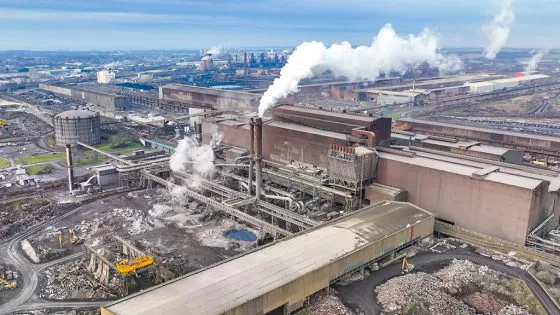The government has taken control of British Steel’s Scunthorpe operations but faces a race against time to keep its blast furnaces running.
Business Secretary Jonathan Reynolds told parliament during an emergency recall on Saturday (12 April) that the facility’s Chinese owner Jingye wanted to “refuse to purchase sufficient raw materials” to keep them operational.
“The company would therefore have irrevocably and unilaterally closed down primary steelmaking at British Steel,” he said.
Reynolds said Jingye was aiming to keep downstream mills – which turn steel into usable products for the construction industry – and supply them using Chinese-made steel, rather than the locally produced material.
MPs voted on Saturday to take control of the plant to keep production operational. It technically remains under the ownership of Jingye but Reynolds said the company would receive fair market value – effectively £0 – if it is fully nationalised.
He added that the government’s preferred option would be co-investment with a new private sector partner.
Trade bodies previously warned of major gaps in supply to the construction industry if the plant closed down.
On Sunday (13 April), Reynolds declined to state that he was sure the plant would receive the raw material supplies it needs to keep the blast furnaces burning.
Speaking on the BBC’s Sunday with Laura Kuenssberg, he said: “I’m not going to get into the specifics of that. Giving us a chance to do that was essential. I’m not going to make my situation or the nation’s situation more difficult by sharing some specific commercial aspects of that.”
This morning (14 April), British Steel’s previous chief commercial officer Allan Bell was named as its interim chief executive, with marketing director Lisa Coulson becoming interim chief operating officer.
Bell said: “Our immediate priorities are securing the raw materials we need to continue blast furnace operations, ensuring we have the dedicated personnel to run those furnaces, and maintaining the highest levels of health and safety for our workforce.”
Gareth Stace, director general of trade body UK Steel, echoed Bell, adding: “If the furnaces cool down, it is virtually impossible for them to be restarted.”
Chinese steelmaker Jingye bought British Steel out of receivership in March 2020, stating that it foresaw “a new illustrious chapter in the history of British steelmaking”.
Last month, it announced it was consulting on plans to close what are the UK’s only remaining blast furnaces, which it said loses £700,000 per day.
In February, Heathrow Airport chief executive Thomas Woldbye announced the company would use UK steel in its third runway build, during a speech at British Steel’s Scunthorpe plant.
The Department for Business and Trade has estimated that the airport’s expansion would require 400,000 tonnes of steel.
On Saturday, prime minister Sir Keir Starmer said: “We are reforming our planning rules to build 1.5 million homes, and the infrastructure the nation desperately needs. New roads, railways, schools, hospitals, grids and reservoirs. British steel will be the backbone as we get Britain building once more.”
Some 95 per cent of Network Rail’s track is supplied by British Steel, prompting it to bid for its rail manufacturing business when it was in receivership in 2019.
The government-owned company confirmed this morning that it is maintaining a 12-month stockpile of track in case of supply issues.

